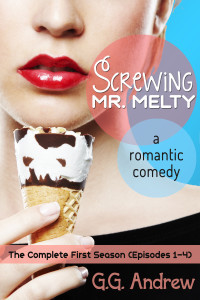G.G. Andrew's Blog, page 20
June 10, 2014
What’s Your Book Diet?
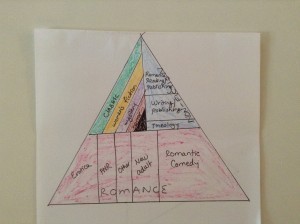
My own book diet pyramid from the first half of 2014. Not pictured: a few half-eaten classics. Sorry I didn’t eat all my veggies, Mom. #notactuallyafirstgradershomework
You know the old USDA Food Guide Pyramid, the shape that specified the amounts of grains, vegetables, and oils Americans should consume daily? I’ve been wondering if we can adapt a similar concept for reading–at least for those of us who like to consciously plan our reading, or maybe just the next book or two. (Spontaneous reading pantsers, you can start your eye rolling now.)
Much like the food types on the food guide pyramid, our reading life is filled with particular genres. Maybe you devour all romance. Maybe you consume mostly literary fiction, with a dash of nonfiction and the occasional mystery. Maybe you nosh on all sorts of genres, from steampunk noir to erotica to comedy to erotic steampunk noir comedy.
Our book diet reflects what we are drawn to, what we enjoy, maybe what others are reading, and also what we feel is important.
What is your current book diet? How ideally would you want it to look?
For those of us who write, I believe it can be additionally useful to consciously plan our reading in terms of what we are writing and how we want to develop as a writer. If you’re a horror writer, for instance, you’ll likely want to devote a fairly big chunk of the pie to reading other horror. But maybe not all. Maybe you want a third of your reading to be literary, because your own writing benefits from reading lovely language.
I know my own drafts have been helped by gorging on romance this year, particularly romantic comedy since this is what I write. It’s been enormously beneficial to see how other authors introduce appealing heroes and relatable heroines, amp up sexual tension, and structure their stories.
Writers need to consider what kind of book fuel will help us grow the ways we want–because, for better or worse, we are likely absorbing the language, forms, character types, and plot devices from what we read.
So choose your pie, and choose wisely. But above all else, enjoy every last bite.
 Tags: book clubs, book diet, books, comedy, contemporary romance, erotica, genre fiction, heroes and heroines, horror, literary fiction, noir, paranormal romance, readers, reading, romance, romantic comedy, sexual tension, steampunk, story structure, writing
Tags: book clubs, book diet, books, comedy, contemporary romance, erotica, genre fiction, heroes and heroines, horror, literary fiction, noir, paranormal romance, readers, reading, romance, romantic comedy, sexual tension, steampunk, story structure, writingDel.icio.us


TweetThis

Digg

StumbleUpon

Comments: 0 (Zero), Be the first to leave a reply!You might be interested in this:
 Manscaping on Book Covers
Manscaping on Book Covers Top Ten Signs You're Reading Literary Fiction
Top Ten Signs You're Reading Literary Fiction Romance Blurb Drinking Game
Romance Blurb Drinking Game Top Ten Romance Releases in 2014Copyright © G. G. Andrew [What's Your Book Diet?], All Right Reserved. 2014.
Top Ten Romance Releases in 2014Copyright © G. G. Andrew [What's Your Book Diet?], All Right Reserved. 2014.May 24, 2014
Kids & Board Books (An Apology to Sandra Boynton)
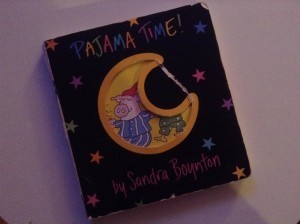 I came late to Sandra Boynton.
I came late to Sandra Boynton.
When my first son was a baby, we were given a copy of children’s author Sandra Boynton’s Moo, Baa, La La La! to read to him. I remember feeling underwhelmed when I first read the little board book. The story was just a bunch of animals, making sounds. Was this really a book? Where was the narrative, beyond that little conflict where the pigs say “La La La!” instead of “oink” as pigs ought? I didn’t get it.
But then I read it to my baby son. And he laughed. And laughed and laughed. To this day, it’s one of the times I remember him giggling hard as a baby.
Here’s the thing about Sandra Boynton that I didn’t get: kids love her books. The animal sounds, the songs, the plump hippos, the excited dogs, the silly pigs.
I confess I’ve sometimes been a harsh critic of kids’ books. I’ll admit I also didn’t get Goodnight Moon…at least the first twenty times I read it. (After that it sort of sends you into a trance-like state.) I want narrative arcs, compelling characters, conflicts to be overcome. I don’t need the mooing so much, the tour through some bunny’s bedroom.
But kids? They love this stuff. At least mine do. When I give my younger son a choice of books at naptime nowadays, he will inevitably choose a Boynton book, often Oh My Oh My Oh Dinosaurs or The Going to Bed Book. And I’ve come to love the books too, the funny rhyming lines and animal characters that fill her stories.
My older son, now six, still reads Sandra Boynton. Over three years ago, he was diagnosed with autism and still has limited ability to speak. Recently I discovered her Happy Hippo, Angry Duck, which has all sorts of moody animals within the pages. I’d like to think seeing and hearing about the angry duck and excited dog helps my son recognize and understand emotions, something I know he must struggle with. But, even if he doesn’t, one thing’s for sure: whenever we read Pajama Time, he bounces on the couch when we sing the pajama time song.
(Sometimes I do, too.)
What Sandra Boynton taught me is this: we should read the books that kids love–not just the books we love, or the books we think they should love. Because a love of books leads to more books, which leads to literacy, pleasure, wonder, imagination, knowledge, perhaps art, definitely possibilities. And that’s something I feel like shouting La La La! about.
 Tags: autism, board books, books, children's literature, kids, literacy, parenting, readers, sandra boynton
Tags: autism, board books, books, children's literature, kids, literacy, parenting, readers, sandra boyntonDel.icio.us


TweetThis

Digg

StumbleUpon

Comments: 0 (Zero), Be the first to leave a reply!You might be interested in this:
 Manscaping on Book Covers
Manscaping on Book Covers Weird Writing Research
Weird Writing Research Top Ten Signs You're Reading Genre Fiction
Top Ten Signs You're Reading Genre Fiction Top Ten Ways to Create Readers
Top Ten Ways to Create Readers Making Mr. Melty Ice Cream: Frozen Fruity FlaxseedCopyright © G. G. Andrew [Kids & Board Books (An Apology to Sandra Boynton)], All Right Reserved. 2014.
Making Mr. Melty Ice Cream: Frozen Fruity FlaxseedCopyright © G. G. Andrew [Kids & Board Books (An Apology to Sandra Boynton)], All Right Reserved. 2014.May 21, 2014
Making the Reader the Heroine
 I loved this recent post from Jeff Goins, The Wrong Reasons to Write. Goins makes a lot of good and interesting points here–the difficulty in writing for just money or fame, in particular–but what really has stuck with me about this post was the bit at the end about making the reader the focus of your writing. In his points to consider at the bottom, Goins first asks, “What if instead of making it about you, you focused on others?”
I loved this recent post from Jeff Goins, The Wrong Reasons to Write. Goins makes a lot of good and interesting points here–the difficulty in writing for just money or fame, in particular–but what really has stuck with me about this post was the bit at the end about making the reader the focus of your writing. In his points to consider at the bottom, Goins first asks, “What if instead of making it about you, you focused on others?”
At first I thought this didn’t apply to me, a romance writer. If you’re writing nonfiction, the idea of focusing on others in your art makes perfect sense. People who blog for writers should be focused on providing content that is helpful to those writers. Journalists writing articles on unknown people, events, or causes are focused on others too, in increasing awareness and sometimes aiding others.
But fiction writers like me? Is this even relevant?
Yes, I think it is. In his second point, Goins writes, ”What if you made the reader the hero, helping her feel understood in a way that she’s never felt before?” This single statement has begun to change how I write romance–and how I view my storytelling.
It feels like we’re raised to think art is about the artist–about telling my story, expressing myself, pouring my emotions onto the page. I think this is what kept me from writing, especially writing fiction, for so many years. It felt selfish. Why should I be writing down all the sexy stories in my head when I could be spending my time in a soup kitchen somewhere?
But art doesn’t have to be selfish, and never really has been. And to see writing as other-focused can have a big impact on our writing and sense of calling as writers.
Since reading Goins’ post, I’ve tried to think of the current romance I’m drafting as a story where the future reader is the heroine. I’ve been asking myself, How can I amp up the romance, the sexual tension for the reader, the heroine of my story? Does she really want all that description on page two? Does she need a funny line here to lighten the mood? How can I connect her to this story of forgiveness and acceptance in ways that make her relate and feel more at peace with those issues in her own life?
Perhaps it’s no volunteering at a soup kitchen, but this shift has made me see my own calling as a writer in a more positive way–and I imagine this will have even more positive ramifications down the road.
 Tags: jeff goins, readers, romance, writing, writing as calling
Tags: jeff goins, readers, romance, writing, writing as callingDel.icio.us


TweetThis

Digg

StumbleUpon

Comments: 1 (One) on this itemYou might be interested in this:
 Romance Blurb Drinking Game
Romance Blurb Drinking Game Top Ten Signs You're Reading Literary Fiction
Top Ten Signs You're Reading Literary Fiction Weird Writing Research
Weird Writing Research What's Your Book Diet?Copyright © G. G. Andrew [Making the Reader the Heroine], All Right Reserved. 2014.
What's Your Book Diet?Copyright © G. G. Andrew [Making the Reader the Heroine], All Right Reserved. 2014.Making the Reader the Heroine of Your Story
 I loved this recent post from Jeff Goins, The Wrong Reasons to Write. Goins makes a lot of good and interesting points here–the difficulty in writing for just money or fame, in particular–but what really has stuck with me about this post was the bit at the end about making the reader the focus of your writing. In his points to consider at the bottom, Goins first asks, “What if instead of making it about you, you focused on others?”
I loved this recent post from Jeff Goins, The Wrong Reasons to Write. Goins makes a lot of good and interesting points here–the difficulty in writing for just money or fame, in particular–but what really has stuck with me about this post was the bit at the end about making the reader the focus of your writing. In his points to consider at the bottom, Goins first asks, “What if instead of making it about you, you focused on others?”
At first I thought this didn’t apply to me, a romance writer. If you’re writing nonfiction, the idea of focusing on others in your art makes perfect sense. People who blog for writers should be focused on providing content that is helpful to those writers. Journalists writing articles on unknown people, events, or causes are focused on others too, in increasing awareness and sometimes aiding others.
But fiction writers like me? Is this even relevant?
Yes, I think it is. In his second point, Goins writes, ”What if you made the reader the hero, helping her feel understood in a way that she’s never felt before?” This single statement has begun to change how I write romance–and how I view my storytelling.
It feels like we’re raised to think art is about the artist–about telling my story, expressing myself, pouring my emotions onto the page. I think this is what kept me from writing, especially writing fiction, for so many years. It felt selfish. Why should I be writing down all the sexy stories in my head when I could be spending my time in a soup kitchen somewhere?
But art doesn’t have to be selfish, and never really has been. And to see writing as other-focused can have a big impact on our writing and sense of calling as writers.
Since reading Goins’ post, I’ve tried to think of the current romance I’m drafting as a story where the future reader is the heroine. I’ve been asking myself, How can I amp up the romance, the sexual tension for the reader, the heroine of my story? Does she really want all that description on page two? Does she need a funny line here to lighten the mood? How can I connect her to this story of forgiveness and acceptance in ways that make her relate and feel more at peace with those issues in her own life?
Perhaps it’s no volunteering at a soup kitchen, but this shift has made me see my own calling as a writer in a more positive way–and I imagine this will have even more positive ramifications down the road.
 Tags: jeff goins, readers, romance, writing, writing as calling
Tags: jeff goins, readers, romance, writing, writing as callingDel.icio.us


TweetThis

Digg

StumbleUpon

Comments: 0 (Zero), Be the first to leave a reply!You might be interested in this:
 Weird Writing Research
Weird Writing Research Romance Flash Fiction
Romance Flash Fiction Top 10 Ways to Use Twitter Without Losing Your Soul
Top 10 Ways to Use Twitter Without Losing Your Soul What Good Books Do
What Good Books Do Writing & ParentingCopyright © G. G. Andrew [Making the Reader the Heroine of Your Story], All Right Reserved. 2014.
Writing & ParentingCopyright © G. G. Andrew [Making the Reader the Heroine of Your Story], All Right Reserved. 2014.May 6, 2014
Romance Blurb Drinking Game
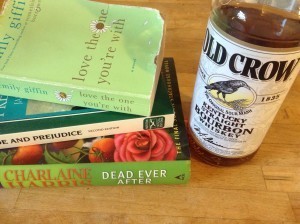 I’ve been looking at tons of romance novel blurbs at online bookstores this year–a consequence of being both an enthusiastic romance reader and writer. Looking at all those book covers and blurbs, I’ve noticed something: if I had a dime for every time I read the words “secret” or “alpha,” I’d be able to buy all the ebooks my heart and loins desire. But while no one is throwing money at me, I’ve got a bottle of bourbon, and that’s almost as good if I drink enough to fill the emptiness in my bank account and maybe soul.
I’ve been looking at tons of romance novel blurbs at online bookstores this year–a consequence of being both an enthusiastic romance reader and writer. Looking at all those book covers and blurbs, I’ve noticed something: if I had a dime for every time I read the words “secret” or “alpha,” I’d be able to buy all the ebooks my heart and loins desire. But while no one is throwing money at me, I’ve got a bottle of bourbon, and that’s almost as good if I drink enough to fill the emptiness in my bank account and maybe soul.
So I created the Romance Blurb Drinking Game below for your drunk romantic pleasure. Grab some friends, the ingredients for some girly cocktails, and open up your favorite online bookstore because you’re about to get shit-faced looking at some shirtless men (shirt-faced?).
But first a caveat: as with other drinking games, don’t go past your limit, don’t drive, and maybe stop purchasing books after the second cocktail.
Round One: Contemporaries
At your favorite online bookstore, search or click on the contemporary romance category. Then click on any book cover you find appealing and follow the drinking directions below. After you’ve read that book blurb, click on another book in the “Customers Who Bought This Item Also Bought” section below it, and follow the drinking directions again. Do this eight more times, for a total of ten contemporaries before moving on to Round Two.
*If the chosen book cover has a man with tattoos on it, take a sip of your cocktail.
*If the book blurb references a “secret,” take another sip. If that secret has the potential to “rip [the hero and heroine] apart,” take a bonus sip.
*If there’s a man with a suit on the cover, take a sip–and wipe that drool off your face.
Round Two: Paranormals
At your favorite online bookstore, search or click on the paranormal romance category. Then click on any book cover you find appealing and follow the drinking directions below. After you’ve read that book blurb, click on another book in the “Customers Who Bought This Item Also Bought” section below it, and follow the drinking directions again. Do this eight more times, for a total of ten paranormal romances before Round Three.
*If you see the prefix “were-” anywhere (werewolf, werepanther, werewombat), howl in the direction of the moon and take a sip of your cocktail.
*If you see the word “alpha,” take a sip. If you’ve ever talked about men in terms of whether they’re alpha or beta in real life, take a bonus sip.
*If the cover features a person, man or woman, you wouldn’t want to meet in a dark alley, take a sip.
Round Three: Historicals
At your favorite online bookstore, search or click on the historical romance category. Then click on any book cover you find appealing and follow the drinking directions below. After you’ve read that book blurb, click on another book in the “Customers Who Bought This Item Also Bought” section below it, and follow the drinking directions again. Do this eight more times, for a total of ten historical romances before Round Four.
*If “rake” or “duke” is mentioned in the title or blurb of the romance, take a sip–like a lady.
*If there’s a woman on the cover with a dress you’d love to wear, take a sip.
*If the woman on the cover is wearing a hat bigger than your family pet, take a sip.
Round Four: Inspirationals
At your favorite online bookstore, search or click on the inspirational romance category. Then click on any book cover you find appealing and follow the drinking directions below. After you’ve read that book blurb, click on another book in the “Customers Who Bought This Item Also Bought” section below it, and follow the drinking directions again. Do this eight more times, for a total of ten inspirational romances, before Round Five.
*If there are fields or flowers on the book cover, take a sip.
*If the man on the cover looks like your uncle, take a sip.
*If the book blurb mentions Amish people, take a big sip.
Round Five: Mysteries and Suspense
At your favorite online bookstore, search or click on the mystery or suspense romance category. Then click on any book cover you find appealing and follow the drinking directions below. After you’ve read that book blurb, click on another book in the “Customers Who Bought This Item Also Bought” section below it, and follow the drinking directions again. Do this eight more times, for a total of ten mystery or suspense romances.
*If the hero of the story is former military, take a sip.
*If the story involves kidnapping, take a long sip.
*If the phrase “before it’s too late” is in the synopsis, take a sip (before it’s too late and your friend drinks your booze).
Thanks for playing! Now walk home to bed. You’re drunk, and that ebook you bought isn’t going to read itself.
 Tags: book blurbs, book covers, books, contemporary romance, drinking games, ebooks, historical romance, inspirational romance, mystery and suspense romance, paranormal romance, reading, romance
Tags: book blurbs, book covers, books, contemporary romance, drinking games, ebooks, historical romance, inspirational romance, mystery and suspense romance, paranormal romance, reading, romanceDel.icio.us


TweetThis

Digg

StumbleUpon

Comments: 0 (Zero), Be the first to leave a reply!You might be interested in this:
 SCREWING MR. MELTY Cover & Teaser!
SCREWING MR. MELTY Cover & Teaser! Top Ten Signs You're Reading Genre Fiction
Top Ten Signs You're Reading Genre Fiction Mr. Melty Curried Carrot Concoction
Mr. Melty Curried Carrot Concoction Top Ten Ways to Create Readers
Top Ten Ways to Create Readers Writing & ParentingCopyright © G. G. Andrew [Romance Blurb Drinking Game], All Right Reserved. 2014.
Writing & ParentingCopyright © G. G. Andrew [Romance Blurb Drinking Game], All Right Reserved. 2014.April 28, 2014
Top 10 Ways to Use Twitter Without Losing Your Soul
I’ve only been on Twitter a few months, but lately it feels like the honeymoon is over. At first it was glorious and wildly fun, but lately I’ve seen some bad behavior on there, tweets and tendencies that give me pause. Which I hate, because social media should be enjoyable and helpful–not like swimming in a pool people have been pissing in.
Of course, I don’t want to be one of those glass house-dwellers throwing stones and all, so I have to admit I’ve probably committed some social media sins–or have been sorely tempted to.
But we can all do better. Though it may seem old-fashioned, I prefer to think of Twitter as the online equivalent of a giant cocktail party, and act accordingly (by which I mean practicing kindness and maybe also drinking things with umbrellas).
So here’s a list of ten things we all should keep in mind when using Twitter. Let’s call it an aspirational list.
Top Ten Ways to Use Twitter Without Losing Your Soul
1.) Assume that any negative tweets about people, whether named or not, will be read by those people.
2.) Attempt to not tweet more than three pictures of cats in one day.
3.) Try not to retweet more than twenty times a day (a.k.a. be the town crier).
4.) Strive to participate at least monthly in the reading and/or writing of tweets with ridiculous hashtags, such as #ruinsachildrensbook or #thingsineversay.
5.) Do not use so many hashtags so often that tweets only barely resemble the English language and reading said tweets feels like deciphering a strange code.
6.) Observe the Golden Rule. If you can’t remember it, try this instead: assume that whenever you’re making a negative comment about someone, whether named or not, that tweet is something you’d say to that person’s face at a cocktail party. With their mom standing next to them. And that person has just learned that their car needs a major repair and/or the grocery store has discontinued their favorite snack food.
7.) When you’re tempted to write something negative, ask yourself: what am I trying to do here? If the answer is simply “vent”: consider stopping, dropping, and rolling away from your phone.
8.) Try to converse with new people who tweet you directly whenever possible, even if it’s just “thank you,” versus just ignoring or favoriting, which can feel like the cocktail party equivalent of someone smiling and walking away. (Of course, people with a gazillion followers may find this difficult, but, whenever possible, try to remember the little people.)
9.) View Twitter as a way to make new friends, not just followers, through kindness and finding common ground and sharing mojito recipes.
10.) Be silly on Twitter at least once daily, and twice on Sundays. Because if there’s one thing we could all use, it’s not snark–it’s silliness.
 Tags: hashtags, social media, Twitter
Tags: hashtags, social media, TwitterDel.icio.us


TweetThis

Digg

StumbleUpon

Comments: 0 (Zero), Be the first to leave a reply!You might be interested in this:
 Mr. Melty Curried Carrot Concoction
Mr. Melty Curried Carrot Concoction Top Ten Signs You're Reading Genre Fiction
Top Ten Signs You're Reading Genre Fiction Writing & Parenting
Writing & Parenting Manscaping on Book Covers
Manscaping on Book Covers Romance Flash FictionCopyright © G. G. Andrew [Top 10 Ways to Use Twitter Without Losing Your Soul], All Right Reserved. 2014.
Romance Flash FictionCopyright © G. G. Andrew [Top 10 Ways to Use Twitter Without Losing Your Soul], All Right Reserved. 2014.April 21, 2014
What Good Books Do
I’m a book sampling slut. Between novel recommendations on Twitter, discounted books on BookBub, and the discovery of new authors, I’m faced on a daily basis with dozens of books I should read, read, read!
Having limited time on my hands, there are only so many books I’m willing and able to read to completion. So what’s a book nerd to do? Sample. I look inside, I peek at excerpts, I download samples to my iPad with a frequency that’s enthusiastic, unwise, and possibly pathological.
And like a saavy speed-dater, I’ve gotten my book sampling down to an imperfect art: I often know by a few paragraphs, if not a few sentences, whether a book is for me. I almost never read a full excerpt anymore; before I hit page three I often know whether something’s going to end up on my TBR list or not.
This is unfair, and I’m likely missing some very good books this way. But with my voracious habits, I’m not sure how else to survive this reading life.
I recently realized the books I continue reading do something different in my head: they open up a tiny space that wasn’t there before. When I read something that really grabs me, it’s like a room is suddenly carved out in my brain with the door slightly ajar. Even when I walk away from that excerpt, the room is still there in my head, filled with the whispers of unanswered questions: What’s in that room? What worlds and objects can be seen? Who are the people who live there? And, above all: what happens?
Those whispered murmurs can continue for weeks, even months. I know; for the past few days I haven’t been able to get the opening of Graham Joyce’s Dark Sister out of my head—so much I tracked it down in my library system this morning, even though I really should be reading a classic for my book club, or that other library book, or one of the dozen ebooks on my iPad.
But Dark Sister? It whispers to me.
This is what good books do. They change you. They put something in your head that wasn’t there before. And even when you read the book, when almost all the questions are answered, that space is still there. The door may be closed, but the room remains—there’s always a little light underneath, waiting for you to open it again.
 Tags:
Tags: Del.icio.us


TweetThis

Digg

StumbleUpon

Comments: 0 (Zero), Be the first to leave a reply!You might be interested in this:
 Top Ten Signs You're Reading Literary Fiction
Top Ten Signs You're Reading Literary Fiction Top Ten Signs You're Reading Genre Fiction
Top Ten Signs You're Reading Genre Fiction Romance Flash Fiction
Romance Flash Fiction Top Ten Romance Releases in 2014
Top Ten Romance Releases in 2014 It's Not Just Me. Right?Copyright © G. G. Andrew [What Good Books Do], All Right Reserved. 2014.
It's Not Just Me. Right?Copyright © G. G. Andrew [What Good Books Do], All Right Reserved. 2014.April 3, 2014
Top Ten Signs You’re Reading Literary Fiction
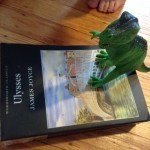
I tried to read Ulysses two summers ago. I failed. I heard it has sex, though, so maybe I’ll skim it someday.
It’s only fair to balance my Top Ten Signs You’re Reading Genre Fiction with a list for those of us with a more literary lean. (Same note as before: this post is meant with much bibliolove; last year I read and enjoyed both The Bridge of San Luis Rey and the newest Bridget Jones.)
Not sure if you’ve been reading literary fiction? Here’s a quiz. If you answer “yes” to more than one of these questions, you’re probably smarter than me and also read literary fiction.
1.) You carry on elaborate internal dialogues about your book with a mental representation of your high school English teacher.
2.) You planned to read fifty books this year, but by April you still find yourself on page sixteen of your current novel despite feeling as though you’ve aged four years.
3.) Your experience reading your latest book is like taking a hit off a powerful drug: you read a paragraph and feel utterly and profoundly moved and changed as a human being, but a minute later have no idea what just happened with the plot.
4.) You would describe at least one of the characters in the book you’re reading now as “too depressed to function.”
5.) You find that your circle of friends will smile and murmur at any sentence that name-drops great literary fiction authors, even sentences that don’t technically make sense. (“So I’ve decided to Franzen this Proust while in the Salinger frame of mind,” you boldly declare at a dinner party. “Mmm-hmm,” your host says, sipping from a chilled glass of white wine. “I couldn’t agree more.”)
6.) Your arms are sore from holding high your latest book on the train so everyone can see the title, author, and blurb from a fellow literary giant.
7.) You know so many obscure words you could probably contract as a writer for the English portion of the SAT.
8.) Your ebooks are filled with those little dotted underlines indicating passages that have been highlighted by sixty-four other readers. And they are not sex scenes.
9.) When someone asks you what your book is about, you hem and haw before finally saying, “It’s hard to explain, but the writing is incredible! You should read it.”
10.) You’re thrilled to read that, six years after your favorite author released her last book, she has finally perfected the first chapter of her next masterpiece.
 Tags: books, literary fiction, reading
Tags: books, literary fiction, readingDel.icio.us


TweetThis

Digg

StumbleUpon

Comments: 4 comments on this itemYou might be interested in this:
 Mr. Melty Curried Carrot Concoction
Mr. Melty Curried Carrot Concoction Writing & Parenting
Writing & Parenting Top Ten Romance Releases in 2014
Top Ten Romance Releases in 2014 It's Not Just Me. Right?
It's Not Just Me. Right? Romance Flash FictionCopyright © G. G. Andrew [Top Ten Signs You're Reading Literary Fiction], All Right Reserved. 2014.
Romance Flash FictionCopyright © G. G. Andrew [Top Ten Signs You're Reading Literary Fiction], All Right Reserved. 2014.March 28, 2014
SCREWING MR. MELTY Cover & Teaser!
I’m happy to announce that the cover and blurb for SCREWING MR. MELTY are now ready for you to feast your eyes on!
SCREWING MR. MELTY will be out in early May, so if you’d like to be one of the first to learn when it’s available and receive exclusive discounts, please join my mailing list!
Here’s the blurb:
Meet Jason: twentysomething caterer, bonafide slut, and hater of processed foods—especially Mr. Melty Ice Cream.
Enter Audrey: middle-aged divorcee, struggling mom, and romantic commitmentphobe—but curious about Jason, the sexy caterer in town.
Is this the hottest thing to happen since the cone met a scoop of vanilla?
There’s just one problem: Max, the owner of Mr. Melty Ice Cream and Audrey’s ex-husband. And the man who’s still in love with her.
Warning: this story contains profanity, sex, and gratuitous descriptions of ice cream. Proceed with caution and BYOS (Bring Your Own Spoon).
Once it’s uploaded, the first episode of SCREWING MR. MELTY will be free. The book is a serialized work of fiction told in seasons of four episodes each. It’s delivered in bite-sized chunks, just like your favorite Tv show, but written like a book. Each episode is about the size of two short stories, the perfect length to read over your lunch break or at night, curled up on the couch with a bowl of rum raisin.
 Tags: books, ice cream, romance, SCREWING MR. MELTY, writing
Tags: books, ice cream, romance, SCREWING MR. MELTY, writingDel.icio.us


TweetThis

Digg

StumbleUpon

Comments: 0 (Zero), Be the first to leave a reply!You might be interested in this:
 Manscaping on Book Covers
Manscaping on Book Covers Top Ten Romance Releases in 2014
Top Ten Romance Releases in 2014 It's Not Just Me. Right?
It's Not Just Me. Right? Top Ten Signs You're Reading Literary Fiction
Top Ten Signs You're Reading Literary Fiction Romance Flash FictionCopyright © G. G. Andrew [SCREWING MR. MELTY Cover & Teaser!], All Right Reserved. 2014.
Romance Flash FictionCopyright © G. G. Andrew [SCREWING MR. MELTY Cover & Teaser!], All Right Reserved. 2014.March 17, 2014
Writing & Parenting
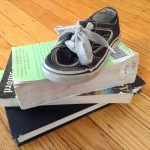
Note the bite marks on the novels. My sons are great consumers of books. They come by it honest.
Writing is harder as a parent. It’s also more necessary.
Two years ago, I used to be a different person. Being a great lover of sleep, I would go to bed by 9 p.m. most nights. I would religiously shower every morning. I would spend free time watching Tv, making crafts, dinking around on the internet.
I don’t do those things anymore–at least, nowhere near as frequently. Since my second son was born nearly two years ago, I’ve changed.
Though my love of stories and writing had been steadily growing, it was summer 2012 that something shifted. When my son was still a tiny newborn, I made a promise to myself to write something every month. A friend of a friend started an online mag and I wrote reviews for the site, as well as pieces for a friend’s book and a very long Christmas letter. Often I wrote while bouncing on an exercise ball, the baby napping in his carrier on my chest.
The following spring I began revising a novel I wrote for a fiction contest. I stayed up late at nights, finding something I loved more than sleep (imagine!). I gave up my sacrosanct showers. I watched Tv less, did other crafts less.
It’s hard to find the time and energy to write when you’re a parent. The world interfers, shrieks, spikes a fever, demands more juice, and smears poop down your shirt. You’re tired at night, you’re tired during the day, you’re tired…Well, you’re just tired. But the change happened within me because I realized it’s so necessary to make that time and energy as a parent–to have something that’s just for you, that doesn’t involve Dora the Explorer or finding ways to make your kids eat veggies. That thing might be writing, like it is for me, or running marathons, scrapbooking, or creating memes of raccoons saying funny things.
You have got to find that thing, admit to that thing, and hold on to it tight. Right now I’m typing this as my kids nap, both of them sick with a nasty virus and having spent the morning taking turns screaming–because they were congested, or simply because the other one screamed.
You don’t need a special room or desk to do your thing. You don’t need hours. You probably don’t even need energy– as when you find that thing, it should give you energy. You just need little pockets of time, little nooks and crannies, little lifelines.
Sometimes I wonder how much I could be writing if I didn’t have kids. All the novels I could have penned by now, all the social media I could have mastered. But I’m not sure I would have written a word. Parenting has made it trickier to do what I’m passionate about, but my sons have made me who I am today. Even in the moments like this morning when the shrieking and such becomes overwhelming, I look at my sons and often think, like The Beach Boys song, God only knows what I’d be without you.
And being a mom, spending most of my life devoted to others, has made writing so much more important, so much more precious, that I’m willing to forgo sleep and hygiene.
So what’s your thing?
 Tags: parenting, writing
Tags: parenting, writingDel.icio.us


TweetThis

Digg

StumbleUpon

Comments: 4 comments on this itemYou might be interested in this:
 Weird Writing Research
Weird Writing Research Romance Flash Fiction
Romance Flash Fiction Mr. Melty Curried Carrot Concoction
Mr. Melty Curried Carrot Concoction Top Ten Romance Releases in 2014
Top Ten Romance Releases in 2014 Manscaping on Book CoversCopyright © G. G. Andrew [Writing & Parenting], All Right Reserved. 2014.
Manscaping on Book CoversCopyright © G. G. Andrew [Writing & Parenting], All Right Reserved. 2014.
